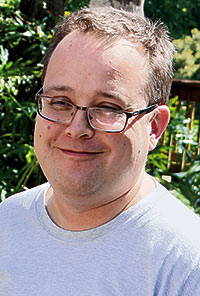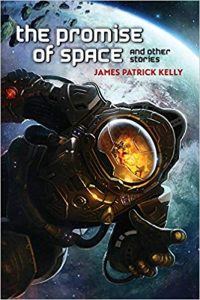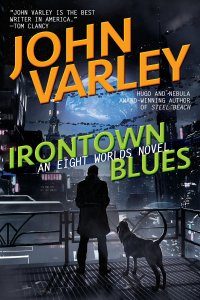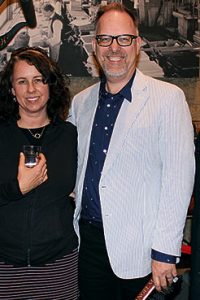Firsts and Lasts by Graham Sleight

As ever, the exercise of trying to infer grand themes from a year’s books (or, more exactly, a year’s reading) is a bit of a lottery. If nothing else, writing and publishing lead-times mean that very few books were a direct verdict on the year in which they were published. But I’d note two themes that struck me. Firstly, it felt like a year when there were more than the average number of strong debut books. And secondly, quite a few of the works I list below are stories of aftermath, of picking up the pieces after some terrible event and figuring out what can be done next.
Ben Aaronovitch’s Lies Sleeping (Gollancz) was one of the strongest in his Peter Grant series of supernatural procedurals: enjoyably readable, gripping in the unravelling of its mysteries, and visibly in love with London. Paolo Bacigalupi & Tobias S. Buckell’s The Tangled Lands (Saga) collected four novellas about a fantasy world of aftermath: an environmental catastrophe has already happened, and the characters have to work out how to deal with it. In The Gone Away Place (Random House), Christopher Barzak once again visited a past-haunted rural Ohio, here dealing with present-day traumas as well. In Foundryside (Archetype), Robert Jackson Bennett started off a new fantasy series, set in the kind of industrialized-magic world that suits his talents especially well. Michael Blumlein’s collection All I Ever Dreamed (Valancourt) included all his short fiction published since The Brains of Rats (1989) and is self-recommending for those, like me, who view him as a unique and irreplaceable voice in the fantastic. Blumlein’s chapbook Thoreau’s Microscope (PM) gave some autobiographical context to the concerns of his fiction.
C.J. Cherryh’s Emergence (DAW) continued her long-standing Foreigner sequence, delving once again into the complexities of relations between aliens and humans. With In the Vanishers’ Palace (Jabberwocky), Aliette de Bodard took on Vietnamese folklore and the myth of Beauty and The Beast in another aftermath-fantasy world. Seth Dickinson’s The Monster Baru Cormorant (Tor) broadened out the setting and concerns of his strikingly convoluted debut The Traitor Baru Cormorant. Andy Duncan’s collection An Agent of Utopia (Small Beer) had some frustrating overlaps with his previous collection The Pottawatomie Giant (2009), but is nonetheless an essential introduction to one of the great tellers of fantastic tall tales. Theodora Goss’s European Travel for the Monstrous Gentlewoman (Saga) took her Athena Club’s members on a thoroughly enjoyable tour of the imaginary Europe they all inhabit. Maria Dahvana Headley’s The Mere Wife (FSG) brought a sharp revisionist eye to bear on the story of Beowulf. Dave Hutchinson’s Europe at Dawn (Solaris) concluded his Fractured Europe sequence in some style, and seemed one of the most topical books of the year. The same could also be said of Simon Ings’s The Smoke (Gollancz), which gains much of its power from its juxtaposition between the known (a lovingly depicted Yorkshire setting) and the alien.
 In The Promise of Space (Prime), James Patrick Kelly again staked a claim to be one of our central SF writers: these stories are deeply committed to the craft, the tropes, and the history of the genre. Juliet Kemp’s The Deep and Shining Dark (Elsewhen) was one of the best debuts of the year, set in a chewy and thought-provoking secondary world that one hopes to see more of. John Kessel’s Pride and Prometheus (Saga) was as different as could be imagined from last year’s The Moon and the Other: it returned to Kessel’s fondness for intertextuality, uniting Mary Shelley and Jane Austen in a story that’s both light and serious. Nancy Kress’s If Tomorrow Comes (Tor) was a successor to last year’s Tomorrow’s Kin, and once again addressed the strangeness and difficulty of human life and survival when aliens are also in the picture. Cixin Liu’s Ball Lightning (Tor) had a smaller compass than his Remembrance of Earth’s Past trilogy, but focussed closely on scientific obsession and its consequences. There were two worthwhile books from new writer Rich Larson: Tomorrow Factory: Collected Fiction (Talos) and a novel, Annex (Orbit). The shorter work in the former gave an idea of why his vivid writing has attracted so much attention, and the latter’s unusual alien invasion story promised a great deal for future volumes. Sam J. Miller’s Blackfish City (HarperCollins) combined concerns about the environment and politics in a way that seemed thoroughly contemporary, while telling several gripping stories. Sarah Perry’s Melmoth (Serpent’s Tail) was the novel that stayed with me most this year: a set of meditations on solitude (chosen or unchosen) revolving around the perhaps-mythical immortal of the title.
In The Promise of Space (Prime), James Patrick Kelly again staked a claim to be one of our central SF writers: these stories are deeply committed to the craft, the tropes, and the history of the genre. Juliet Kemp’s The Deep and Shining Dark (Elsewhen) was one of the best debuts of the year, set in a chewy and thought-provoking secondary world that one hopes to see more of. John Kessel’s Pride and Prometheus (Saga) was as different as could be imagined from last year’s The Moon and the Other: it returned to Kessel’s fondness for intertextuality, uniting Mary Shelley and Jane Austen in a story that’s both light and serious. Nancy Kress’s If Tomorrow Comes (Tor) was a successor to last year’s Tomorrow’s Kin, and once again addressed the strangeness and difficulty of human life and survival when aliens are also in the picture. Cixin Liu’s Ball Lightning (Tor) had a smaller compass than his Remembrance of Earth’s Past trilogy, but focussed closely on scientific obsession and its consequences. There were two worthwhile books from new writer Rich Larson: Tomorrow Factory: Collected Fiction (Talos) and a novel, Annex (Orbit). The shorter work in the former gave an idea of why his vivid writing has attracted so much attention, and the latter’s unusual alien invasion story promised a great deal for future volumes. Sam J. Miller’s Blackfish City (HarperCollins) combined concerns about the environment and politics in a way that seemed thoroughly contemporary, while telling several gripping stories. Sarah Perry’s Melmoth (Serpent’s Tail) was the novel that stayed with me most this year: a set of meditations on solitude (chosen or unchosen) revolving around the perhaps-mythical immortal of the title.
 Embers of War (Titan) by Gareth L. Powell was another aftermath story. In this case, the book addresses the question of what can be done to atone after a shockingly savage war. Kim Stanley Robinson’s Red Moon (Orbit) was less expansive than some of his recent books, and no worse for that: a thriller (at least in premise) set on a closely imagined Chinese-controlled lunar landscape. John Scalzi’s The Consuming Fire (Tor) was another second-book-of-a-trilogy, in this case taking forward an ambitious space-opera plot with admirable skill. John Schoffstall’s Half-Witch (Small Beer), though billed as YA, had plenty for all to chew on in its vision of a magic-inflected Europe and a protagonist with a direct (if interference-riddled) line to God. All the Fabulous Beasts by Priya Sharma (Undertow) was a debut collection: strange, powerful, ambitious, and direct. Vandana Singh’s Ambiguity Machines (Small Beer) was an essential short fiction collection in a year that saw many good ones. Singh’s superb work has appeared in a wide range of venues, and it is good to have a representative selection in one place. There were two good novels from Charles Stross, Dark State and The Labyrinth Index (both Tor). I preferred the latter, the most recent instalment in the Laundry Files sequence, wherein unspeakable creatures from beyond our imagining meet their match in the British Civil Service. Lavie Tidhar’s Unholy Land (Titan) was a provocative and sparky alternate history: from Tidhar, one would expect nothing less. Catherynne M. Valente’s Space Opera (Saga) set out to be light and frothy, and that’s very much a matter of taste. For me, its pop-culture fun was exactly what I needed after a series of grim dystopias (see above, see below). John Varley’s Irontown Blues (Ace) was a welcome return to his Eight Worlds setting, with a detective plot told using Varley’s considerable narrative cunning. Jo Walton’s Starlings (Tachyon) was a long-overdue assembly of the author’s short fiction: like Kessel, she has been concerned with using fiction to address and critique her predecessors’ work. Finally, Lisa Yaszek’s anthology The Future is Female! (Library of America) provided an invaluable series of glimpses of the US SF written by women up to the 1960s.
Embers of War (Titan) by Gareth L. Powell was another aftermath story. In this case, the book addresses the question of what can be done to atone after a shockingly savage war. Kim Stanley Robinson’s Red Moon (Orbit) was less expansive than some of his recent books, and no worse for that: a thriller (at least in premise) set on a closely imagined Chinese-controlled lunar landscape. John Scalzi’s The Consuming Fire (Tor) was another second-book-of-a-trilogy, in this case taking forward an ambitious space-opera plot with admirable skill. John Schoffstall’s Half-Witch (Small Beer), though billed as YA, had plenty for all to chew on in its vision of a magic-inflected Europe and a protagonist with a direct (if interference-riddled) line to God. All the Fabulous Beasts by Priya Sharma (Undertow) was a debut collection: strange, powerful, ambitious, and direct. Vandana Singh’s Ambiguity Machines (Small Beer) was an essential short fiction collection in a year that saw many good ones. Singh’s superb work has appeared in a wide range of venues, and it is good to have a representative selection in one place. There were two good novels from Charles Stross, Dark State and The Labyrinth Index (both Tor). I preferred the latter, the most recent instalment in the Laundry Files sequence, wherein unspeakable creatures from beyond our imagining meet their match in the British Civil Service. Lavie Tidhar’s Unholy Land (Titan) was a provocative and sparky alternate history: from Tidhar, one would expect nothing less. Catherynne M. Valente’s Space Opera (Saga) set out to be light and frothy, and that’s very much a matter of taste. For me, its pop-culture fun was exactly what I needed after a series of grim dystopias (see above, see below). John Varley’s Irontown Blues (Ace) was a welcome return to his Eight Worlds setting, with a detective plot told using Varley’s considerable narrative cunning. Jo Walton’s Starlings (Tachyon) was a long-overdue assembly of the author’s short fiction: like Kessel, she has been concerned with using fiction to address and critique her predecessors’ work. Finally, Lisa Yaszek’s anthology The Future is Female! (Library of America) provided an invaluable series of glimpses of the US SF written by women up to the 1960s.
 Among non-fiction books, it was especially good to have a couple of volumes of work by the late Ursula K. Le Guin: Dreams Must Explain Themselves: The Selected Non-Fiction of Ursula K. Le Guin (Gollancz) and Ursula K. Le Guin: Conversations on Writing, (Tin House). These are self-recommending, and among other things amount to an argument that Le Guin should be understood as one of the most important critics of the fantastic. Benjamin Robertson’s None of This Is Normal: The Fiction of Jeff VanderMeer (University of Minnesota Press) provided a helpful set of ways into an important writer’s work. Jo Walton’s An Informal History of the Hugos: A Personal Look Back at the Hugo Awards, 1953-2000 (Tor) did exactly what the title promised, with the added attraction of Walton’s intelligent and thoughtful voice. Finally, Henry Wessells’s A Conversation Larger than the Universe (The Grolier Club) was an idiosyncratic and delightful gathering of enthusiasms.
Among non-fiction books, it was especially good to have a couple of volumes of work by the late Ursula K. Le Guin: Dreams Must Explain Themselves: The Selected Non-Fiction of Ursula K. Le Guin (Gollancz) and Ursula K. Le Guin: Conversations on Writing, (Tin House). These are self-recommending, and among other things amount to an argument that Le Guin should be understood as one of the most important critics of the fantastic. Benjamin Robertson’s None of This Is Normal: The Fiction of Jeff VanderMeer (University of Minnesota Press) provided a helpful set of ways into an important writer’s work. Jo Walton’s An Informal History of the Hugos: A Personal Look Back at the Hugo Awards, 1953-2000 (Tor) did exactly what the title promised, with the added attraction of Walton’s intelligent and thoughtful voice. Finally, Henry Wessells’s A Conversation Larger than the Universe (The Grolier Club) was an idiosyncratic and delightful gathering of enthusiasms.
One final note: looking back at the year-in-review pieces I’ve written in the past, I see that I haven’t mentioned before Gardner Dozois’s massive and indispensable Year’s Best anthologies. Yet it’s hard to overstate the effect Dozois’s choice and taste has had on me – and, I suspect, on many others. The idea that there will be no more after this year’s volume, The Year’s Best Science Fiction: Thirty-fifth Annual Collection is almost impossible to believe.
Ten books of the year:
All I Ever Dreamed, Michael Blumlein (Valancourt)
An Agent of Utopia, Andy Duncan (Small Beer)
The Mere Wife, Maria Dahvana Headley (FSG)
Pride and Prometheus, John Kessel (Saga)
Blackfish City, Sam J. Miller (HarperCollins)
Melmoth, Sarah Perry (Serpent’s Tail)
Red Moon, Kim Stanley Robinson (Orbit)
Half-Witch, John Schoffstall (Small Beer)
Ambiguity Machines, Vandana Singh (Small Beer)
Space Opera, Catherynne M. Valente (Tor)
This and more like it in the February 2019 issue of Locus.
 While you are here, please take a moment to support Locus with a one-time or recurring donation. We rely on reader donations to keep the magazine and site going, and would like to keep the site paywall free, but WE NEED YOUR FINANCIAL SUPPORT to continue quality coverage of the science fiction and fantasy field.
While you are here, please take a moment to support Locus with a one-time or recurring donation. We rely on reader donations to keep the magazine and site going, and would like to keep the site paywall free, but WE NEED YOUR FINANCIAL SUPPORT to continue quality coverage of the science fiction and fantasy field.







